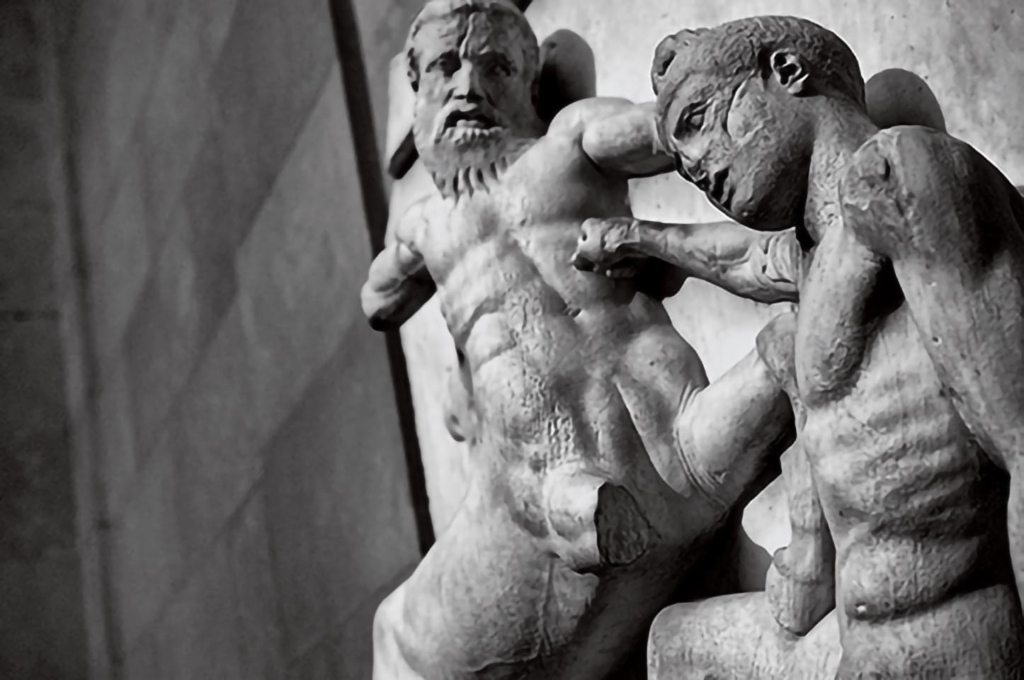
On the question of where art and archaeology belong, Professor Elizabeth Marlowe explores all possibilities.
A collection of statues and carvings from the ancient Greek Acropolis have been displayed at the British Museum for nearly two centuries, despite demands from Greece for the artworks to be returned. The pieces have come to be called the Elgin Marbles, named for the British ambassador who sold them to the museum. A panel of experts, including art and art history professor Elizabeth Marlowe, debated the issue at the Boston Athenaeum on Oct. 7, 2021.
When the museum approached Marlowe to participate in the forum, it offered her the opportunity to argue for the Greek side (returning the marbles) or the British side (keeping the marbles in the UK). Because she teaches both sides of the argument in her classes, she said she’d do either. To Marlowe’s slight dismay, the museum asked her to present the less popular stance, fighting for the British. But, ultimately, she was grateful that it pushed her to think harder about the issue.
In searching for an argument to leave the marbles in the British Museum, Marlowe grappled with the bigger questions around Western museums built on colonial pillaging.
“If we care about decolonizing, if we care about righting the wrongs of the past, it’s not the Elgin Marbles that are the most egregious examples of abuses of power in the British Museum,” says Marlowe, the Christian A. Johnson Endeavor Chair in liberal arts studies. Returning the Elgin Marbles before returning objects stolen from African or Asian countries would only send the message that pillaging from white European nations is worse than taking things from formerly colonized countries.
In the debate, Marlowe pointed to the Benin Bronzes, a vast collection of ivory statues, wooden heads, and brass sculptures that were looted from the Kingdom of Benin at the end of the 19th century in a bloody conquest. The Nigerian government has been requesting the return of the artifacts for decades, but the British Museum has refused.
For Marlowe, the question of whether the Elgin Marbles should be sent back to Greece is moot until the British Museum creates a plan to return items stolen during the colonial period. It’s a process many European museums are already undertaking. Belgium has promised to return at least 2,000 works to the Democratic Republic of Congo. France also recently approved the return of 27 heritage objects to Benin and Senegal.
“We may be at a turning point right now,” Marlowe says. “It’s possible that the British Museum might not be able to keep its head in the sand for much longer.”
In addition to considering the ethical implications of returning different objects, Marlowe thinks it’s also worth looking at aesthetic decisions about how objects are displayed. At the Boston Athenaeum event, those arguing in favor of returning the Elgin Marbles to Greece repeatedly noted that it would be better for the full collection to appear at the Acropolis Museum in Athens. But Marlowe thinks there’s a benefit to seeing historic artworks in a variety of settings, whether it’s a collection of Greek art from throughout history, or some of the Elgin Marbles set alongside Aztec art in Mexico City.
“One argument for having them in two different museums is precisely the fact that those are two different ways of encountering the objects, and there’s value in that diversity,” Marlowe says.
But whether the public agrees is another question. At the end of the night in Boston, the majority of the audience had sided with the Greek opinion.
Other panelists at the debate included former Massachusetts governors Michael Dukakis and Joseph Hern.
